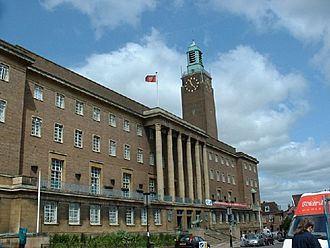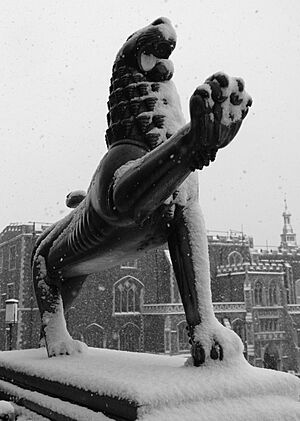City Hall, Norwich facts for kids
Quick facts for kids City Hall |
|
|---|---|

View of City Hall from St. Peter's Street
|
|
| General information | |
| Type | City hall |
| Architectural style | Art Deco |
| Location | Norwich, Norfolk, England |
| Address | City Hall, St. Peter's Street, Norwich, NR2 1NH |
| Current tenants | Norwich City Council |
| Completed | 1938 |
| Height | 56.4 m (185 ft) |
| Design and construction | |
| Architect | Charles Holloway James, Stephen Rowland Pierce |
|
Listed Building – Grade II*
|
|
| Official name | City Hall including Police Station |
| Designated | 29 January 1971 |
| Reference no. | 1210484 |
Norwich City Hall is a really cool building in Norwich, England. It was finished in 1938 and is a great example of Art Deco style. This building is where the Norwich City Council works, helping to run the city. It's also one of the "Norwich 12," which are twelve important historical buildings in the city. In 1971, it was given a special status as a Grade II* listed building, meaning it's very important and protected.
History
Building the new City Hall meant some older buildings in Norwich had to be taken down. These included Tudor, Regency, and Victorian buildings on St. Peters Street. Many old yards and city buildings were also removed to make space.
Two architects, Charles Holloway James and Stephen Rowland Pierce, designed the building. They followed a plan for the whole area made by Robert Atkinson. In 1931, a competition was held to choose the best design. A total of 143 different ideas were submitted!
After the winning design was picked, there were some delays. The Great Depression, a time when the economy was very tough, slowed things down. Also, the planning process took a long time. Because of this, the first stone wasn't laid until 1936. Finally, King George VI and Queen Elizabeth officially opened Norwich City Hall on October 29, 1938.
Architecture
The architects created an amazing Art Deco public building for Norwich. It was built with the best materials and methods available at the time. Even the bricks were special! Each one was made two inches longer than usual to look just right with the building's design.
Alfred Hardiman was the sculptor who helped design many parts of the building. He created the famous lions passant that stand guard at the entrance. He also made three figures representing Recreation, Wisdom, and Education, which you can see outside the Council Chamber.
Another artist, James Woodford, designed the six main bronze doors. These doors have 18 round pictures that show the history and industries of Norwich. Eric Aumonier carved the city's coat of arms above a window on Bethel Street. Inside, Margaret Calkin James designed the fabrics for some of the important rooms.
The City Hall uses many beautiful materials from around the world. These include Italian marble and English stone. You'll also find wood like Honduras mahogany and Australian walnut. The seats are covered in soft Moroccan leather. Different rooms are decorated with panels of elm, oak, teak, and birch wood. The Lord Mayor's special eight-sided room has panels made of sycamore wood with French walnut details. Its door is made of English walnut.
The front of the building is very long, about 280 feet. It has a balcony that is 200 feet long. The city council says this is the longest balcony of its kind in the UK! The bell in the clock tower has the deepest sound in all of East Anglia. Both the bell and the clock were made by a company called Gillett & Johnston.
 | James Van Der Zee |
 | Alma Thomas |
 | Ellis Wilson |
 | Margaret Taylor-Burroughs |


